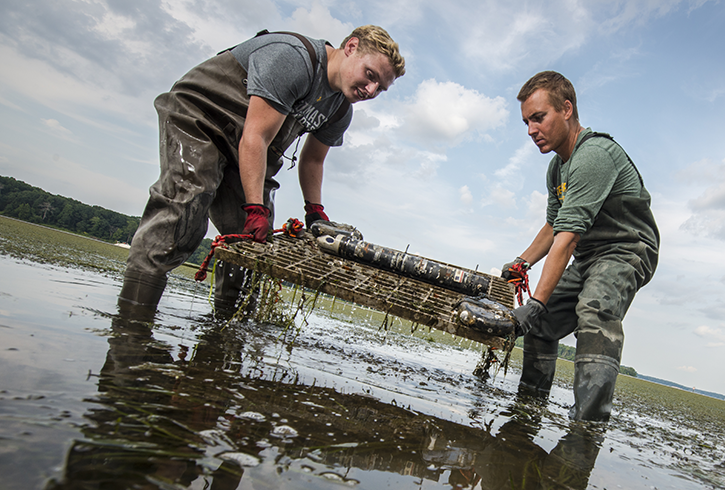“Tyler’s natural passion for the ocean, big waves, and a history of chasing coastal storms made him uniquely qualified to join our hurricane surge research team."
— Celso Ferreira, associate professor in the Sid and Reva Dewberry Department of Civil, Environmental, and Infrastructure Engineering

Civil engineering senior Tyler Miesse (left) works with Celso Ferreira, associate professor in civil, environmental, and infrastructure engineering, on research that focuses on how vegetation in coastal marshes can protect communities from waves and flooding.
“Surf’s up” has more than one meaning for civil engineering senior Tyler Miesse.
The Virginia Beach native loves surfing, the ocean, and the coast, but it wasn’t until he took a water resource engineering course that he realized there was a way to turn his passions into a career.
On the first day of class, Celso Ferreira, associate professor in civil, environmental, and infrastructure engineering, talked about how he grew up surfing in Brazil, and he explained that some of his research focuses on how vegetation in coastal marshes can protect communities from waves and flooding.
Miesse felt a connection with a fellow surfer, and he was intrigued by the research. “I have always loved waves because I surf. This research is a way to study the physics behind those waves,” he says. “I can figure out how to make the place where I grew up better by stopping flood destruction."
He asked Ferreira if he could help with the studies, and for almost two years, the undergraduate has been working as a research assistant in Mason’s Flood Hazards Research Lab.
About half of Miesse’s time is spent in the field, wading in water and mud to put battery-powered wave and flow sensors in the marshes in the Magothy Bay Natural Area Preserve on the Eastern Shore of Virginia, as well as along the Chesapeake Bay in Deal Island, Maryland.
The rest of the time, he’s in the lab running simulations and doing calculations on the research group’s findings.
Before Hurricane Florence in September, Miesse was part of a team that raced to Deal Island to deploy sensors to measure waves from the storm. They found that during the hurricane, vegetation reduced the waves' energy by 80 percent over a 100-meter stretch from the front to the back of the area, he says.
The researchers continue to investigate the characteristics of vegetation that will best protect communities against storm surges.
Ferreira is impressed with Miesse’s work. “Tyler’s natural passion for the ocean, big waves, and a history of chasing coastal storms made him uniquely qualified to join our hurricane surge research team,” Ferreira says. “He has quickly developed strong computational skills that allow him to translate his physical understanding of the ocean waves to engineering research. He has a bright future ahead of him.”
Miesse, who graduates in December, won an OSCAR Student Excellence Award for his research. He has accepted a job as a coastal resilience engineer with Dewberry in Fairfax, and he plans to pursue a master’s degree from Mason, studying with Ferreira, who is well-known in this field. “He’s my mentor. He’s someone I look up to.”
“I love doing research, so I want to keep doing what I’m doing now,” Miesse says. “I hope my work will make a difference in the world.”
“I have always loved waves because I surf. This research is a way to study the physics behind those waves. I can figure out how to make the place where I grew up better by stopping flood destruction."
— Tyler Miesse, civil engineering senior
